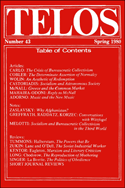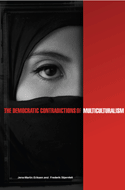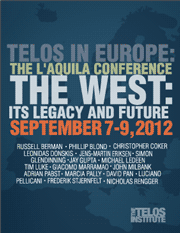By Tomash Dabrowski · Tuesday, October 2, 2012 As an occasional feature on TELOSscope, we highlight a past Telos article whose critical insights continue to illuminate our thinking and challenge our assumptions. Today, Tomash Dabrowski looks at Richard Wolin’s “An Aesthetic of Redemption: Benjamin’s Path to Trauerspiel“ from Telos 43 (Spring 1980).
 Despite renewed interest in Walter Benjamin, his work still remains enigmatic seventy years after his death, and the obscurity of his thought is compounded by the efforts of friends and associates wishing to reclaim his work to their respective traditions. Those who knew him during his lifetime—and especially those instrumental to the belated dissemination of his work—sometimes repudiate his theological motifs, others his particular variant of Marxism (or questioning whether he could be called a Marxist at all). But there seems to be a consensus as to their incongruity. Adorno for instance once chastised Benjamin’s work as “undialectical,” and Gershom Scholem found his theology to be plagued by ill-conceived communist alliances (which is to say nothing about his dispute with Hannah Arendt about which school of thought Benjamin’s contribution legitimately lies). Leszek Kołakowski’s reading, in his eminent Main Currents of Marxism, is emblematic of the mischief caused by measuring Benjamin’s work against the weight of tradition. Kołakowski finds that Benjamin “seems to have tried to graft historical materialism on his own theory of culture, which had nothing to do with Marxism and which he had worked out beforehand.” Despite renewed interest in Walter Benjamin, his work still remains enigmatic seventy years after his death, and the obscurity of his thought is compounded by the efforts of friends and associates wishing to reclaim his work to their respective traditions. Those who knew him during his lifetime—and especially those instrumental to the belated dissemination of his work—sometimes repudiate his theological motifs, others his particular variant of Marxism (or questioning whether he could be called a Marxist at all). But there seems to be a consensus as to their incongruity. Adorno for instance once chastised Benjamin’s work as “undialectical,” and Gershom Scholem found his theology to be plagued by ill-conceived communist alliances (which is to say nothing about his dispute with Hannah Arendt about which school of thought Benjamin’s contribution legitimately lies). Leszek Kołakowski’s reading, in his eminent Main Currents of Marxism, is emblematic of the mischief caused by measuring Benjamin’s work against the weight of tradition. Kołakowski finds that Benjamin “seems to have tried to graft historical materialism on his own theory of culture, which had nothing to do with Marxism and which he had worked out beforehand.”
Continue reading →
By Brendan O'Connor · Friday, September 28, 2012
-
Gary Gutting responds to Bertrand Russell and Adam Smith on work, leisure, and value for The Stone.
-
Timothy Spangler reviews Wealth and Poverty: A New Edition for the Twenty-First Century and Free Market Revolution: How Ayn Rand’s Ideas Can End Big Government for the Los Angeles Review of Books: “Many of the same post-War thinkers are referenced, and in many ways the two books complement each other—one a large dense and highly ornamented Wagner opera, the other a memorable Broadway show with tunes you can hum during the cab ride home.”
-
Anthony Gottlieb explores evolutionary psychology’s “Just So Stories” for the New Yorker.
Continue reading →
Writing in City Journal, Jens-Martin Eriksen and Frederik Stjernfelt discuss the parallels between the recent violence and protests regarding the anti-Islam film The Innocence of Muslims and the Danish cartoon controversy six years ago:
 In the current Mohammed film crisis, certain patterns repeat themselves from the crisis over the Danish cartoons six years ago. In both cases, Middle East Islamists seized on a marginal piece of anti-Islam criticism to put pressure on the West—and on more moderate forces in their own countries. In the current Mohammed film crisis, certain patterns repeat themselves from the crisis over the Danish cartoons six years ago. In both cases, Middle East Islamists seized on a marginal piece of anti-Islam criticism to put pressure on the West—and on more moderate forces in their own countries.
The Western reaction is also familiar, particularly in its understanding of the Middle East as a bonfire waiting to happen and criticism of Islam as the spark that ignites it. Descriptions of the YouTube film (a trailer, actually) that “sparked protests in many Muslim countries”—as the New Yorker put it in a typical formulation—rely on this false metaphor. It suggests that the protests are spontaneous occurrences that would not have come about without such a spark, and that the demonstrating Muslims are primitive savages governed by passion, not responsible for their own actions. The only parties with control over their actions are the filmmakers.
Continue reading →
By Ruth Starkman · Thursday, September 20, 2012 Jens-Martin Eriksen and Frederik Stjernfelt’s The Democratic Contradictions of Multiculturalism, published by Telos Press, is available for purchase here. The following interview with the authors appeared on the Huffington Post.
There is a moment in Jens-Martin Eriksen and Frederik Stjernfelt’s The Democratic Contradictions of Multiculturalism, when an Indian-Malaysian interview subject leans toward Eriksen and entreats him to describe the Malaysian multiculturalism as an “apartheid.” He invokes the infamous example of the erstwhile South Africa to underscore the distinct disadvantage his family experiences as a religious and ethnic minority in their native county with its “hard” form of multiculturalism. This provocative claim raises many questions about how multiculturalism is experienced in different contexts around the world.
Continue reading →
By Telos Press · Wednesday, September 19, 2012 Jens-Martin Eriksen, co-author (with Frederik Stjernfelt) of The Democratic Contradictions of Multiculturalism, recently appeared on The Agenda with Steve Paikin to discuss the rise of hatred in Western nations. Watch the video after the break.
Continue reading →
By Ruth Starkman · Tuesday, September 18, 2012 Ruth Starkman’s report on the recent Telos in Europe conference appeared in the Huffington Post.
 An uncannily warm light fills L’Aquila’s 13th century Basilica Santa Maria di Collemaggio. As one approaches the altar, it becomes clear the illumination falls in from the open sky. The roof and dome collapsed in L’Aquila’s catastrophic 2009 6.3 earthquake. While the church is still undergoing repair, much of the edifice appears intact, newly reinforced by concrete and already restored in many parts. In fact, it attests to the continued vitality of this ancient European city as it slowly rebuilds amid various economic, legal and bureaucratic struggles. An uncannily warm light fills L’Aquila’s 13th century Basilica Santa Maria di Collemaggio. As one approaches the altar, it becomes clear the illumination falls in from the open sky. The roof and dome collapsed in L’Aquila’s catastrophic 2009 6.3 earthquake. While the church is still undergoing repair, much of the edifice appears intact, newly reinforced by concrete and already restored in many parts. In fact, it attests to the continued vitality of this ancient European city as it slowly rebuilds amid various economic, legal and bureaucratic struggles.
L’Aquila and its historic buildings offer a unique place to debate the problems of Europe and the West, as the latter have also endured their share of continuing crises and efforts to rebuild. From Sept 7-10, 2012, some 50 philosophers, historians, literature scholars, social theorists, European Parliament members gathered to debate the fate of “The West: Its Legacy and Future” in the inaugural conference in L’Aquila hosted by the Telos Institute and the independent publisher Telos Press, which publishes the eponymous journal of politics and thought.
Continue reading →
|
|
 Despite renewed interest in Walter Benjamin, his work still remains enigmatic seventy years after his death, and the obscurity of his thought is compounded by the efforts of friends and associates wishing to reclaim his work to their respective traditions. Those who knew him during his lifetime—and especially those instrumental to the belated dissemination of his work—sometimes repudiate his theological motifs, others his particular variant of Marxism (or questioning whether he could be called a Marxist at all). But there seems to be a consensus as to their incongruity. Adorno for instance once chastised Benjamin’s work as “undialectical,” and Gershom Scholem found his theology to be plagued by ill-conceived communist alliances (which is to say nothing about his dispute with Hannah Arendt about which school of thought Benjamin’s contribution legitimately lies). Leszek Kołakowski’s reading, in his eminent Main Currents of Marxism, is emblematic of the mischief caused by measuring Benjamin’s work against the weight of tradition. Kołakowski finds that Benjamin “seems to have tried to graft historical materialism on his own theory of culture, which had nothing to do with Marxism and which he had worked out beforehand.”
Despite renewed interest in Walter Benjamin, his work still remains enigmatic seventy years after his death, and the obscurity of his thought is compounded by the efforts of friends and associates wishing to reclaim his work to their respective traditions. Those who knew him during his lifetime—and especially those instrumental to the belated dissemination of his work—sometimes repudiate his theological motifs, others his particular variant of Marxism (or questioning whether he could be called a Marxist at all). But there seems to be a consensus as to their incongruity. Adorno for instance once chastised Benjamin’s work as “undialectical,” and Gershom Scholem found his theology to be plagued by ill-conceived communist alliances (which is to say nothing about his dispute with Hannah Arendt about which school of thought Benjamin’s contribution legitimately lies). Leszek Kołakowski’s reading, in his eminent Main Currents of Marxism, is emblematic of the mischief caused by measuring Benjamin’s work against the weight of tradition. Kołakowski finds that Benjamin “seems to have tried to graft historical materialism on his own theory of culture, which had nothing to do with Marxism and which he had worked out beforehand.”  In the current Mohammed film crisis, certain patterns repeat themselves from the crisis over the Danish cartoons six years ago. In both cases, Middle East Islamists seized on a marginal piece of anti-Islam criticism to put pressure on the West—and on more moderate forces in their own countries.
In the current Mohammed film crisis, certain patterns repeat themselves from the crisis over the Danish cartoons six years ago. In both cases, Middle East Islamists seized on a marginal piece of anti-Islam criticism to put pressure on the West—and on more moderate forces in their own countries.  An uncannily warm light fills L’Aquila’s 13th century Basilica Santa Maria di Collemaggio. As one approaches the altar, it becomes clear the illumination falls in from the open sky. The roof and dome collapsed in L’Aquila’s catastrophic 2009 6.3 earthquake. While the church is still undergoing repair, much of the edifice appears intact, newly reinforced by concrete and already restored in many parts. In fact, it attests to the continued vitality of this ancient European city as it slowly rebuilds amid various economic, legal and bureaucratic struggles.
An uncannily warm light fills L’Aquila’s 13th century Basilica Santa Maria di Collemaggio. As one approaches the altar, it becomes clear the illumination falls in from the open sky. The roof and dome collapsed in L’Aquila’s catastrophic 2009 6.3 earthquake. While the church is still undergoing repair, much of the edifice appears intact, newly reinforced by concrete and already restored in many parts. In fact, it attests to the continued vitality of this ancient European city as it slowly rebuilds amid various economic, legal and bureaucratic struggles. 

